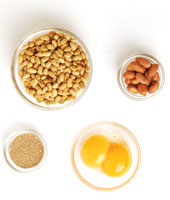Advertisement
Love Lipotrophics
If preventing compromised liver function, blood-vessel or gallbladder disease, depression, or age-related memory changes is your goal, then choline and inositol should be two definite additions for your daily supplement regime. Choline and inositol, also called lipotrophic factors and considered part of the B vitamin family, are compounds naturally present in the body that assist … Continued

If preventing compromised liver function, blood-vessel or gallbladder disease, depression, or age-related memory changes is your goal, then choline and inositol should be two definite additions for your daily supplement regime.
Choline and inositol, also called lipotrophic factors and considered part of the B vitamin family, are compounds naturally present in the body that assist in the breakdown and use of fat and cholesterol. Because of their role in fat metabolism, these nutrients are promoted for fat loss, despite the lack of evidence to support this claim.
Nonetheless, choline and inositol are involved in the formation of cell membranes, hormones, and neurotransmitters and as such have beneficial effects on many biological functions.
Cell Double Agents
The majority of the body’s choline is found in specialized fat molecules known as phospholipids, the most common of which is called phosphatidyl choline (usually derived from lecithin). As a component of phospholipids, choline plays a role in the structure of cell membranes and also assists with cell-membrane signal transmission and reception.
Like choline, inositol is primarily involved in cellular structure and function and fat processing by the liver. Inositol also supports the function of muscles, eye tissues, and nerves and therefore may be used in the treatment of muscular dystrophy or other nervous system disorders.
Gotta Get Them
Good food sources of choline include brewer’s yeast, fish, egg yolks, peanuts, soy, and the best source, soy lecithin. Inositol is found in most of these same foods, as well as in unprocessed whole grains and wheat germ and in some fruits, including raisins, citrus, and cantaloupe.
In supplement form, doses of inositol range from two to 12 grams daily, without side effects. The dosage for choline (typically as phosphatidylcholine) tends to be lower, ranging from 400 to 1,200 mg daily. At higher doses, choline may form a compound that causes an unpleasant fishy body odour during metabolism.
Whether you are currently experiencing liver problems, cholesterol issues, mood disorders, pregnancy, or you are simply interested in preserving optimal health, choline and inositol are proven effective and safe for long-term use. Not all products are created equally, though, so visit a local health food store for advice about your best quality choices.
Enamoured with Inositol
- Inositol enhances the activity of serotonin, making it useful in the treatment of depression, obsessive compulsive disorder, premenstrual syndrome, panic disorder, bipolar disorder, and bulimia. In double-blind studies inositol was as effective as selective serotonin reuptake inhibitors (SSRIs, or antidepressants) in managing symptoms, without side effects.
- Inositol works in conjunction with other nutrients to support homocysteine metabolism, to prevent the accumulation of fats in the liver, and to maintain favourable cholesterol balance.
- As the fibre component of phytic acid, inositol may have cancer-protecting properties. Evidence suggests that reduced incidence of certain cancers with fibre-rich diets may, in fact, be due to the large amounts of inositol present in fibre.
- If you consume coffee or tea daily, consider an inositol supplement. Caffeine depletes natural inositol, which can lead to hair loss, eczema, eye problems, depression, high cholesterol, or constipation.
Crazy for Choline
Choline is a precursor for the neurotransmitter acetylcholine, which is involved with memory and muscle function. Muscular dystrophy, Alzheimer’s disease, cognitive disorders, and tardive dyskinesia (involuntary movements) may improve with choline supplements.
Choline offers further aid for osteoporosis, arterial disease, and stroke by helping to maintain low levels of the amino acid homocysteine. A study reported by the Linus Pauling Institute showed that low choline levels, especially when accompanied by a deficiency in folic acid, caused homocysteine to accumulate.
Fat and cholesterol are transported in the body with the help of choline, which helps to convert fatty compounds into very low-density lipoproteins. If insufficient choline is present, fat and cholesterol can accumulate in the liver causing fatty liver, gallstones, or arterial disease.
Phosphatidylcholine supplements are highly beneficial during pregnancy and breastfeeding. Brain and nervous system development as well as learning and attention are influenced by choline. Babies with choline-rich diets may also enjoy protection from cognitive decline common later in life.




